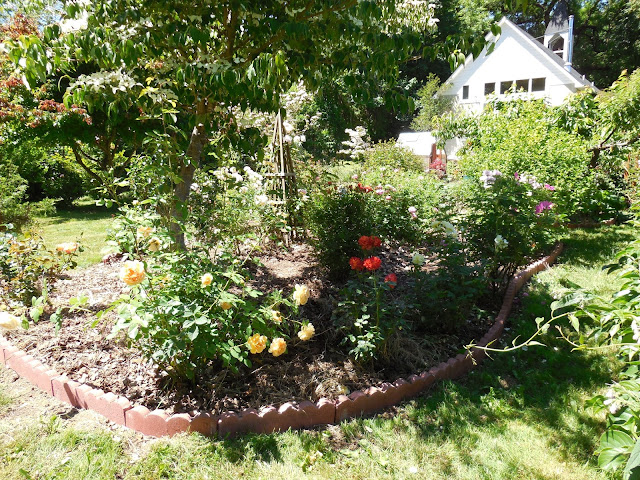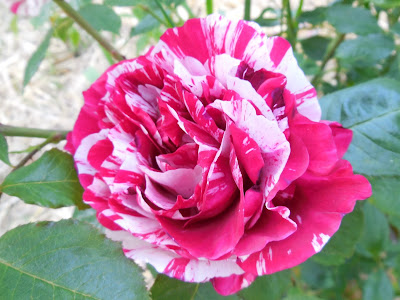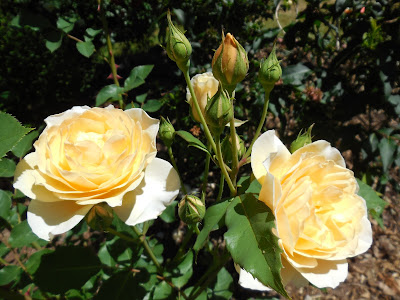 |
| The legendary Ruth Stout harvesting rhubarb |
Views Lofty and Low is a blog about God and life this side of paradise. Life this side of paradise encompasses a lot -- basically everything in the physical universe, which God created.
So, let's talk about roses.
My goal in gardening is to make everything as low-maintenance as possible, while maintaining plant health and beauty. Roses, as many of you know, require much care in order to look beautiful. So, if I can find any little trick to make rose care easier, then I'm on it.
Years ago, probably through Organic Gardening magazine, I heard about this spunky, elderly woman named Ruth Stout, who advocated a thick, year-round mulch on her vegetable garden. Her
No-Work Garden Book (copyright 1971) is a classic for organic gardeners. Hay (preferably spoiled) was her primary mulch of choice. She would initially apply a good 9" (or so) layer of hay over the entire vegetable garden, then add more as it slowly composted. She did not till the hay in. It always stayed loosely on top.
 |
| My valuable copy |
Here in the McKenzie Valley, leaves are plentiful in the fall, so that's my mulch of choice. I spread the leaves high over the vegetable garden and the rose garden, letting the mulch sit over the winter. By spring, the leaves have composted and settled so much that a fresh topper of hay or straw is needed. Ruth Stout, from Connecticut, got spoiled hay for free from a local farmer. I get leaves for free, but must pay for hay or straw. So obviously I favor leaves.
What are the benefits of a thick mulch? First, it decomposes into a rich compost. Stout's soil was so rich, she didn't use fertilizer. She didn't even add extra compost. I do add some extra compost and organic fertilizer at planting -- but maybe I'm wasting time, money and effort by doing so. Of course, rich soil results in lush, healthy, green plants that resist pests and diseases. And of course, the fruits and vegetables are top quality.
 |
| Our straw-mulched rose garden in foreground, the vegetable garden in background (2014) |
Another benefit of a thick mulch is it significantly cuts down on watering-- big time. Mulch holds in moisture. Need I say more?
 |
| Vegetable garden at planting time in May 2014. Rhubarb nearly ready to pick. |
 |
| This is either Evelyn or Abraham Darby (David Austin roses). Notice straw. |
Another benefit of a thick mulch is "no tilling." The mulch attracts earth worms, which eat the mulch and produce high-nitrogen castings. The good worms bore through the dense soil, loosening it.
And finally, a year-round, thick mulch significantly cuts down on weeds. Those unwanted plants can't push through the mulch.
When sowing seeds, it's important to scoot the thick mulch away from the furrow, so the seedlings won't suffocate. Same applies to setting out starts. Scoot the mulch away a bit, so the starts have air to breath.
 |
| Rose garden as of June 2015. No new straw yet this season. Remnants of fall leaves as mulch. |
So, what does this have to do with roses? My rose garden is fairly new. In fall 2012, I decided to transplant most of my roses into a designated "rose garden." Of course, I spread leaves thickly and added straw in the spring.
 |
| Evelyn rose trained as a climber |
During the growing season of 2013, the results were amazing. The Ruth Stout method produced lush, green, vigorous growth and beautiful blooms. Ruth Stout goes strictly organic, avoiding sprays; she claims to get very little black spot. I'm not a purist, so I do spray (every 3-4 weeks) for insects (primarily aphids) and diseases. I also top-dress each rose bush in the spring with organic fertilizer.
The 2015 season has kicked in and I've never had better roses. My previous "non-mulched" roses were clearly inferior in growth and vigor. But it was these same anemic roses that I transplanted into the new garden in fall of 2012. It's like they were resurrected. If you think a hay or straw mulch is ugly, then just flip the mulch over. The partially decomposed underside is dark and more attractive.
So there you go. Do you want to grow healthy, beautiful roses? Try the Ruth Stout "no-work" garden method.
 |
| Scentimental |
 |
| Hot Cocoa |
 |
| Abraham Darby |
 |
| Graham Thomas |
 |
| Denise's mystery rose from her previous residence |
 |
| Double Delight |








































